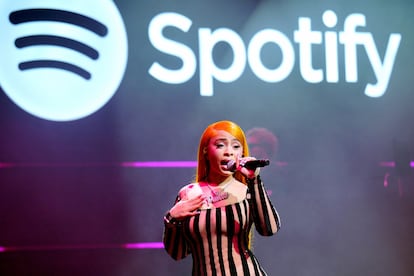Music streaming giants eliminate songs with low play counts
The royalty payment system known as pro rata benefits the most popular artists like Taylor Swift, but leaves many others with millions of streams earning just a few dollars a year

Something curious is happening in the vast digital world of music: millions of songs on streaming platforms like Spotify remain unplayed. Recently, the Swedish company and others have begun reconsidering their strategies to deal with this excess. A recent example is the case of several Spanish indie bands that were removed from Spotify and other applications by their digital distributor, Altafonte, due to low play counts.
This change in approach can be seen in Spotify’s new policy: not paying royalties for songs with fewer than 1,000 streams in a year. A report from Luminate in 2023 revealed that 82.7% of songs were streamed less than 1,000 times, and that nearly 25% had no streams at all. With the constant growth of the music catalog, unstreamed songs are predicted to reach 100 million by 2028.
The cost of maintaining these platforms has increased dramatically, from $35 million in 2019 to more than $130 million in 2022. Even though Spotify finally reported profits in the last quarter of 2023, it faced significant challenges, including three rounds of layoffs and a hike in their rates. However, it remains the global leader with 226 million subscribers and 574 million monthly users.
These changes reflect pressure on streaming platforms due to their high operating costs, investor impatience with tech companies that do not generate consistent profits, and competition from giants such as Apple and Amazon, which support their streaming services with other lines of business.
The royalty payment system, known as “pro rata,” benefits the most popular artists like Taylor Swift, but leaves many others with millions of streams earning just a few dollars a year. Although Spotify’s value has tripled since the pandemic, the proportion of revenue going to artists has not increased significantly.
Traditional record labels, on the other hand, continue to benefit from music rights accumulated over the years, making profits without needing to invest in new talent. Responding to this scenario, Universal Music and Warner in France have adopted a new model, initially proposed by Deezer, where royalties will only be paid to songs with a minimum of monthly reproductions and by at least 500 different users. In addition, tracks considered “noise” will be eliminated.
The main challenge for the survival of streaming is how to handle music generated by artificial intelligence and massive catalogs that seek to take advantage of royalties without focusing on quality. This situation threatens to displace thousands of artists struggling to stand out in a market dominated by algorithms.
Thus, streaming services, which promised to revolutionize access to music, now faces a crucial dilemma: how to balance offering an extensive catalog with the need to guarantee fair income for artists and maintain their own economic viability. Meanwhile, music lovers will do well to preserve their vinyl and CD collections, witnesses of a different era in the music industry.
Sign up for our weekly newsletter to get more English-language news coverage from EL PAÍS USA Edition
Tu suscripción se está usando en otro dispositivo
¿Quieres añadir otro usuario a tu suscripción?
Si continúas leyendo en este dispositivo, no se podrá leer en el otro.
FlechaTu suscripción se está usando en otro dispositivo y solo puedes acceder a EL PAÍS desde un dispositivo a la vez.
Si quieres compartir tu cuenta, cambia tu suscripción a la modalidad Premium, así podrás añadir otro usuario. Cada uno accederá con su propia cuenta de email, lo que os permitirá personalizar vuestra experiencia en EL PAÍS.
¿Tienes una suscripción de empresa? Accede aquí para contratar más cuentas.
En el caso de no saber quién está usando tu cuenta, te recomendamos cambiar tu contraseña aquí.
Si decides continuar compartiendo tu cuenta, este mensaje se mostrará en tu dispositivo y en el de la otra persona que está usando tu cuenta de forma indefinida, afectando a tu experiencia de lectura. Puedes consultar aquí los términos y condiciones de la suscripción digital.








































